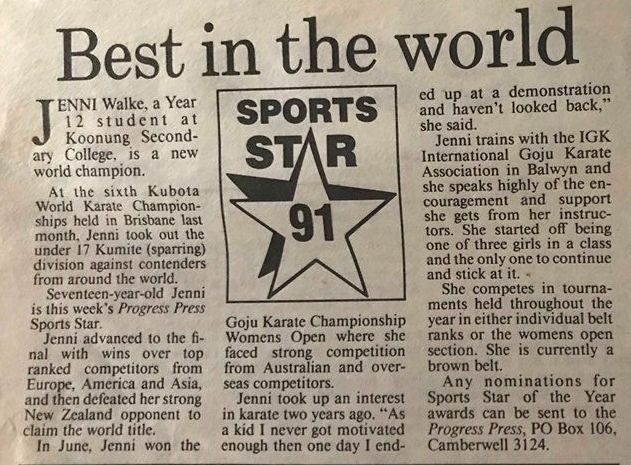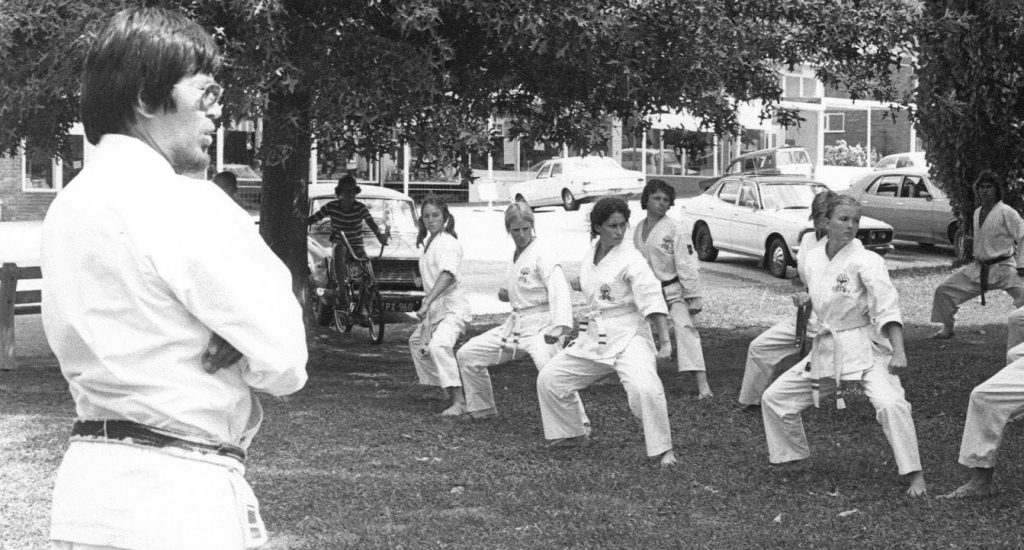Since martial arts have been around, women have been involved. In recent times it appears there may be a resurgence of interest with women taking up the arts and there are good reasons for it, no matter which style they choose.
In the history of fifty years of Tino Ceberano Hanshi teaching karate in Australia, there have been many women that achieved black belt ranking and performed well in competition. Others attended camps and regular class training and attest to the impact it had on their lives. Evelyn Dalpas, the first female to achieve black belt from the Goju Kai St Kilda dojo in the 1970s is seen below at a Tallangatta summer camp. Evelyn found the era to be an inspiring period in her life and says she was never fitter. She immensely enjoyed the training and created long lasting friendships.
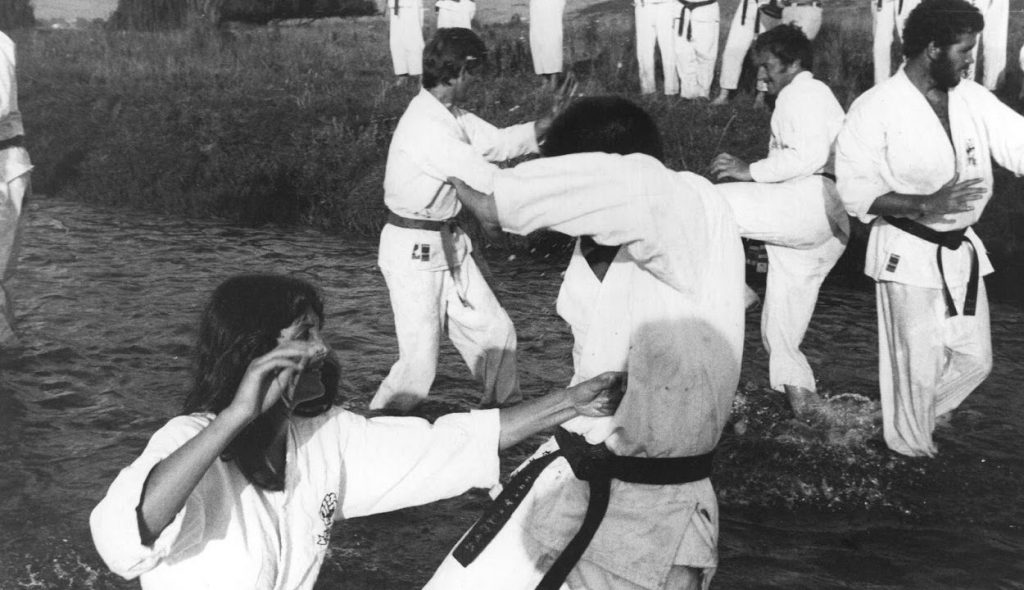
Regardless of the level achieved, martial arts training has always been one of the healthiest sports for girls and women to get involved with, at any age and for many reasons.
Fitness
Using multiple muscle groups is the first principle of getting fit, especially the ones we sit on all day.
We might think those gym machines will do the job but sitting or lying down on the job is not the same as using the body in the way it was designed to work.
When your workout includes moving and kicking, you introduce a whole new use of your body. Combining upper and lower body movements ties the connection together and gets your core involved. You’ll burn a lot more joules and improve your cardiac capacity.
If you really want to explore fitness you’ll want to build strength, endurance, flexibility, stamina, balance, coordination, mobility, speed and core stability – the martial arts offers it all.
Posture
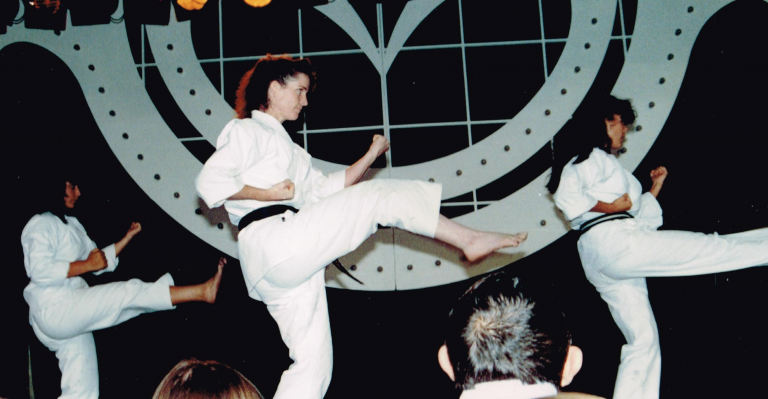 The different stances and movements work the core and require a balanced, neutral posture to move properly. This teaches you to hold yourself better and more upright, unlike the terrible slouched postures your computer work induces.
The different stances and movements work the core and require a balanced, neutral posture to move properly. This teaches you to hold yourself better and more upright, unlike the terrible slouched postures your computer work induces.
Better posture telegraphs your self-esteem and confidence, acting in a subtle way as a deterrent to others who sense you’re not an easy victim and look elsewhere for easy prey. In a way, simply standing better is your first line of self-defense and regular practice enhances your posture.
Better posture means everything works better in your body including joint range of motion, breathing, digestion and concentration. You start enjoying better health immediately when you train your core and martial arts is a great way to do this.
Flexibility
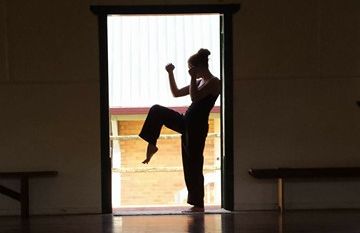
All movement helps flexibility and martial arts will work the hips, pelvis and other joints improving your overall mobility. If you don’t use it, you lose it, as we often say. Supervised warm ups and sensible stretching will help prevent a range of injuries and other problems.
The digital era has created more hours of immobility than ever before. Young people are developing injuries and suffering from aches and pains at an unprecedented rate. The need for regular exercise and flexibility has never been greater and we need fun ways to exercise.
Tech neck, forward head posture, headaches, low back pain, stiff shoulders – this is the life of the typical teenager with too much screen time and heaps of spinal strain. Spending quality time using your body in the dojo will pay dividends.
It is a fact that many young people suffer low back and hip pains. The practice of stretching, kicking, lower stances and lower body conditioning is likely to strengthen your chassis offering you great health benefits – like being more pain free! After all, movement is life.
Self Defense
Women should feel safe and having some basic training in the martial arts provides you with a better sense of awareness, the ability to stand up for yourself and some knowledge of what to do in a potentially dangerous situation. By undertaking karate training, you will gain confidence, self-esteem and mental & physical strength as well.
Regardless of which martial art you choose, you’ll benefit from having some basics under your belt like recognising signs of aggression, learning to evade, breaking a grip or grasp, striking back, delivering a blow that tells your aggressor to shove off and very simply, not being a victim.
Not every women aspires to become a fighter. Even if you never needed to use self-defense techniques in your entire lifetime, there are multiple benefits for you in learning them. Tino Ceberano Hanshi was featured on varied TV programmes from the 1970s including the Roy Hampson Show on Channel 0 demonstrating self-defense techniques to women. He continues to inspire women today to enjoy traditional Goju karate.
Confidence
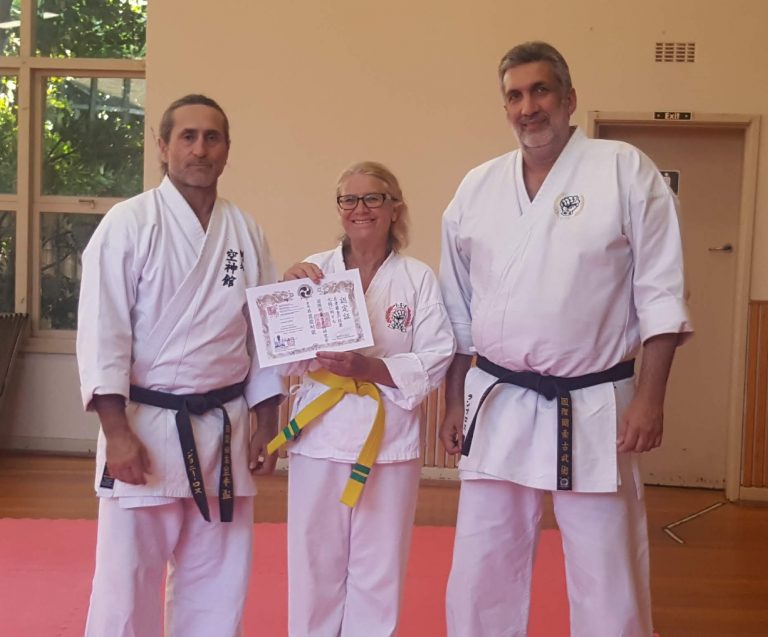 Having strong, powerful women as role models is very empowering for other women. We learn by example and by wishing to emulate our mentors.
Having strong, powerful women as role models is very empowering for other women. We learn by example and by wishing to emulate our mentors.
When you develop speed, strength, fitness and technique, it follows that self-confidence and self-esteem improves.
This spills over and impacts every other area of your life and can only be a positive benefit to your work, social life and well-being.
Women like Karen Lyons at I.G.K. Headquarters Victoria started karate training later in life and it has changed her life around.
Involvement
Training in a group offers so many benefits to self-improvement. We start with good intentions but a solo appearance to the gym may not eventuate whereas working out with others has the benefit of a social link, support and supervision. We’re more likely to reach out goals working with others. Many hands make light work as they say – and so it is with group training.
We also learn by watching and doing so having people around you learning at the same pace means we’re not so focused on ourselves and if we feel like being bothered. Being involved in a club or group is a great way for all to achieve their goals while helping others to reach theirs.
You will be joining a club, class or dojo where strangers will become your teammates. Working together creates great bonds and dispels doubts that you may have about your ability. We all have self-imposed limits and we grow when test ourselves.
Martial arts are built around the principles of humility, courtesy and respect. Training is about helping each other and it is always respectful. What better way is there to exercise and learn new skills while becoming a better person and thinking less about ourselves.
Sports
With the introduction of Karate and Taekwando to the Olympics, women seeking a competitive sport can get involved in the combat sports at any level they choose.
Most clubs and region have competitions with safety always being a focus.
This is a sport that uses the mind, reflex, strategy and fitness. It builds confidence and empowerment while building a strong sense of belonging in a club or organisation.
Tight communities where women support and raise each other are powerful and enriching to each others’ lives. The bonds built here can be ever lasting.
Leadership
We are fortunate in the I.G.K. to have several strong female role models in our leadership like Judy Angeles Sensei whohas attracted a strong following with her emphasis on safe straining and helping everyone achieve their goals regardless of age, background or ability. The focus on community and family carries on the traditional spirit and values taught by Tino Ceberano Hanshi since the 1960s.
Age is No Barrier
Most clubs cater for all age groups and I.G.K. VIC Headquarters at Canterbury holds dedicated childrens’ classes well represented by boys and girls from the age of four onwards. There is no upper age limit and we have female seniors training regularly to keep fit, focused and flexible. Clubs have introductory special offers well worth checking out.
Lessons for life
So many women have said that their karate years gave them a foundation for life skills. The martial arts have a way of flowing into other areas of your life, teaching you to move beyond what you ever thought you could do and achieve.
It is a metaphor for living – if you can improve in the dojo you can improve and succeed elsewhere, Be something more than you ever imagined!
“If there is any part of your life you wish to change. start with a martial art – engaging in the fighting arts will transform you” says Tino Hanshi.

Kathy Koch Senpai from Hawaii relates her story. “When I began training, there weren’t many women role models to look up to. Tino Hanshi never gave me a break or expected less of me because I was a girl.
When I stepped in the dojo, or even outside the dojo, I was pushed as hard as the men and the standards were set. The bar was high. Because no excuses were given or accepted, I learned I could achieve so much more than I thought I could. This mindset is still within me in all the things I attempt.”
Val Boyd Senpai in Tasmania says, “My regular training connected body and brain, giving me a deeper understanding of my actual capabilities as well as the automaticity that karate relies on. Without training there is no confidence in self body and mind.”
Val Senpai is pictured below (bottom row 2nd from left) at one of the famed Tallangatta camps in VIC during the 1970s. This era when many women attended karate training and reached black belt level is legendary in the history of Goju Kai and I.G.K. A notable visitor to this camp was Wakako Yamaguchi Sensei, daughter of the founder of Goju Kai, Gogen Yamaguchi Hanshi, centred in this photo.
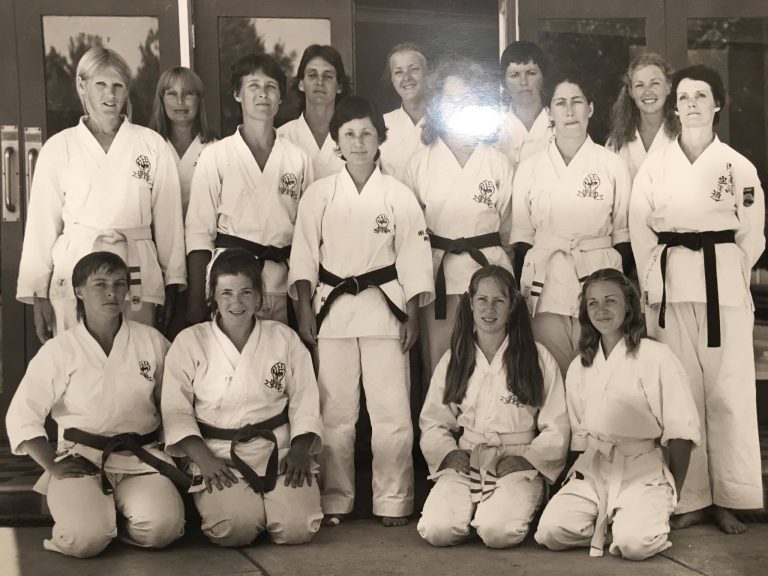
Judy Angeles Sensei retells her training history.
“In 1974 when I began karate-do at the Mount Gambier YMCA Seishikan Dojo I did not believe that I would ever get to green belt level let alone Shodan level. Nor did I visualise becoming an instructor or even dream of having my own dojo.
However, it has been a journey that unfolded before me and I followed the path ahead. For me, that’s what martial arts is all about. I have been fortunate to have had a number of dedicated and insightful instructors in my life – especially during the formative years and I give full credit to those who taught me the concepts of mind, body & soul.
I love martial arts for the indiscriminate nature that it creates for anyone interested to learn and I’ve always found the dojo open to all without prejudice, particularly amongst the I.G.K. practitioners. I shall be eternally grateful to Tino Hanshi for his belief, guidance and infectious passion for the martial arts that he instills into all of us.
He genuinely encourages us to achieve our best – always whilst making everyone in the room feeling equally included. I devoted many years to Karate-do and have experienced a deep satisfaction in imparting knowledge to women in particular, sharing and exploring many aspects of self-defense. Each new group proves to be unique and inspires me to continue on. It is very rewarding to see the thrill on a young person’s face when they realize their own
strengths – that’s equally empowering for both of us.”
Cherie Ceberano Sensei achieved 3rd Dan in her training. She was strong, courageous and held her own in kumite with excellent budo. She was graded to 3rd Dan by Gogen Yamaguchi Hanshi in Tokyo. Cherie often participated in self-defence demonstrations at events and she is seen below defending her attacker Phil Chin Quan Senpai at Dallas Brooks Hall in 1972.
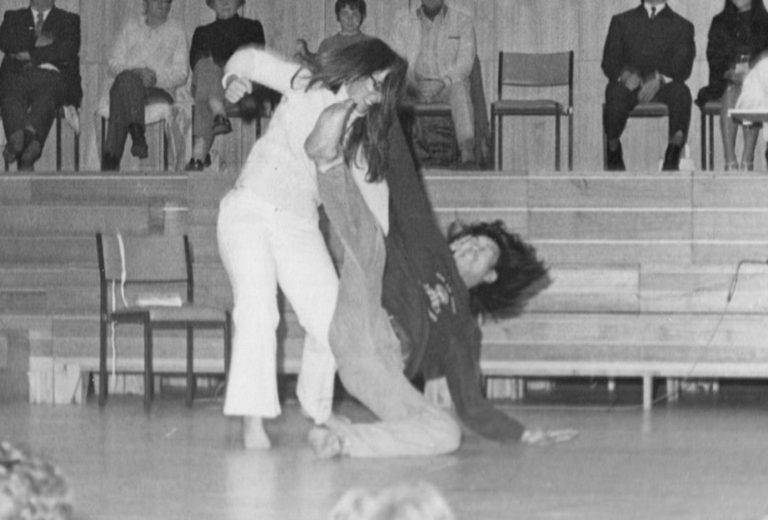
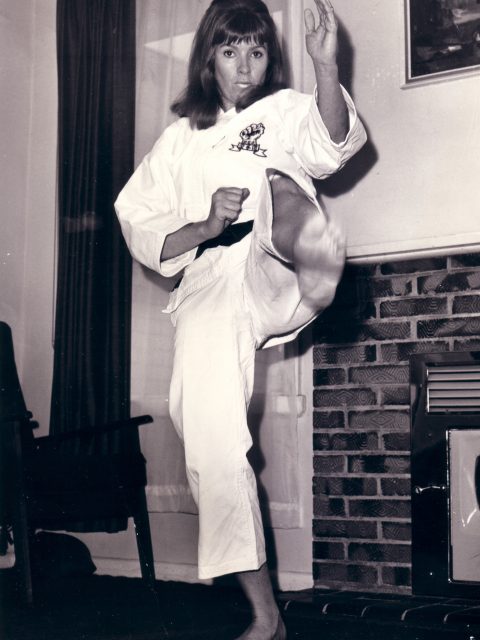
Flora Lord Senpai graded for her Shodan-Ho black belt in 1971 with Cherie Ceberano Sensei.
They were the first two women to achieve this rank in the club.
Flora Senpai says 47 years later that the martial arts gave her an understanding and capability to be centred and she credits the training to having been extremely valuable to her in those years.
Flora Senpai at left demonstrates a mae geri. Flora’s husband Bob Lord was in the first group of students at Canterbury in 1968 and trained with Tino Hanshi for several years.
Yvette Black Sensei, 3rd Dan, trained at Ashburton and Dandenong dojos with Brian Curren Sensei and Ray Kennedy Shihan amongst other noted instructors in the Goju Kai. Yvette participated in many demonstrations and eventually ran her dojo at Gembrook for 20 years. She is another great example of women going the extra mile and pushing the boundaries in the history of the club. Yvette’s son Daniel Black Sensei trained with her for many years to 3rd Dan. Below is Yvette Black Sensei throwing Brian Curren Sensei with Tomoe-nage, a judo throw.
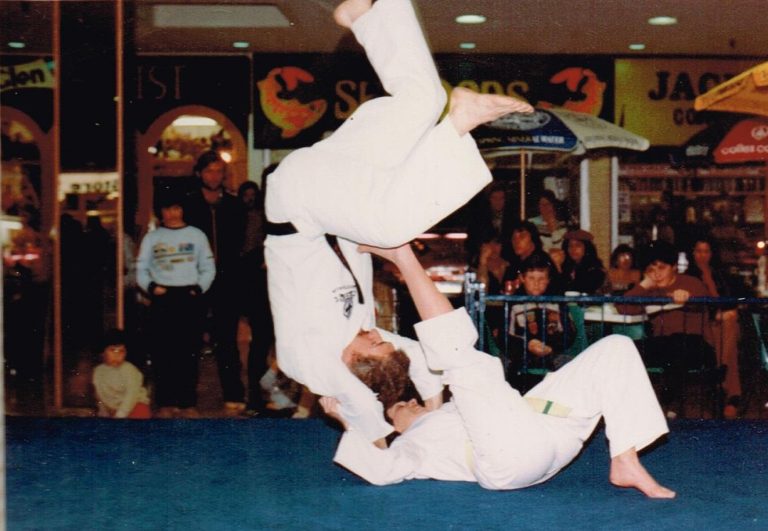
Yvette Sensei relates that the club was doing a demonstration at The Glen Shopping Centre in Glen Waverley in the 1980s. She remembers the empowerment she felt as a yellow belt when she successfully threw her black belt instructor as practiced and the crowds cheered.
Yvette Sensei says that there are many paths to the top of the mountain – for her it has been achieved with budo. She feels that being truly empowered comes from finding the strength within. She also reminds us that in her day there was one only club division for women at competition, whether it was kata or kumite and that was an open division for all ranks from white belt to black belt. If you were game enough to try, you were welcome to do so. That’s spirit!
“The gift that practicing karate gives women is discovering inner grit, determination, perseverance and courage. .. the four pillars of empowerment.” says Yvette Black Sensei.
Deborah Brawn Senpai in Brisbane achieved her Shodan-ho black belt late in 2017. She has trained with Steve Dare Shihan at I.G.K. Redcliffe and has proudly strived to reach her goal.
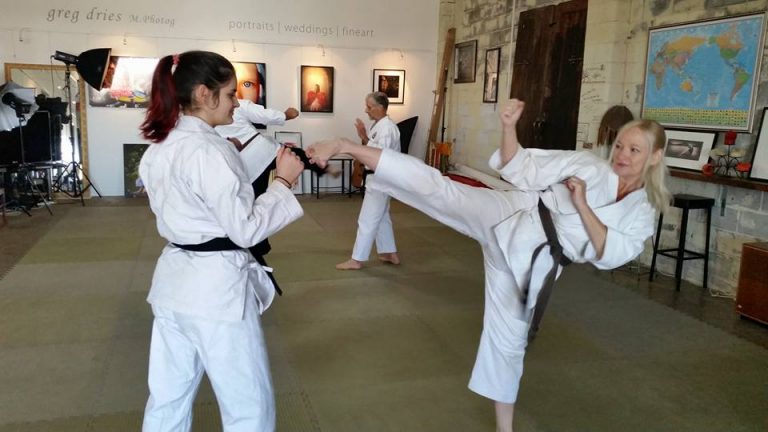

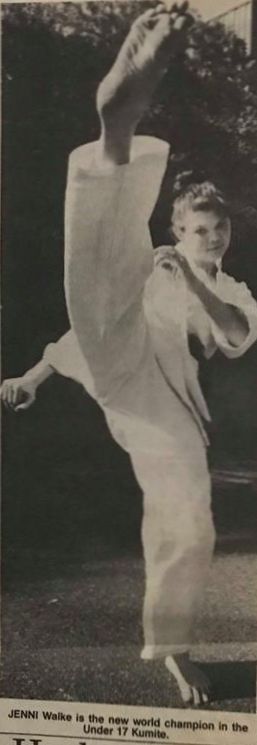
Jenni Walke Sensei met TC in 1989 at age 16 years when Tino Ceberano Shihan came to Koonung High School in Box Hill to talk about self-defense and performed a karate demonstration.
Jenni was determined to learn the art and threw herself into it with a passion training four to five times a week. She joined the uchi deshi (apprentice instructor) programme at the same time as Mike Wheeler and Jenni trained for the next 11 years with the I.G.K. eventually achieving her 3rd Dan, one of the few females in the club history to do so.
Jenni Sensei had the unique opportunity to travel overseas with the I.G.K. to the Maui Festival of Kings training with Prof Wally Jay and Fred Imperial Sensei (Tino Hanshi’s first martial arts instructor in kempo) and to many other interstate events during her training.
She credits her karate years with helping her become what she is and giving her the strength and confidence to facilitate and present in front of large group of people in her occupation.
Jenni joined the Air Force and spent some years training with Warwick Shiels Shihan at the I.G.K. Canberra dojo. She is featured in a news article below.
Today Jenni continues to train Jiu Jitsu and has great memories of her time training with Tino Ceberano Kyoshi, Peter Pritchard Sensei and Warwick Shiels Shihan.
